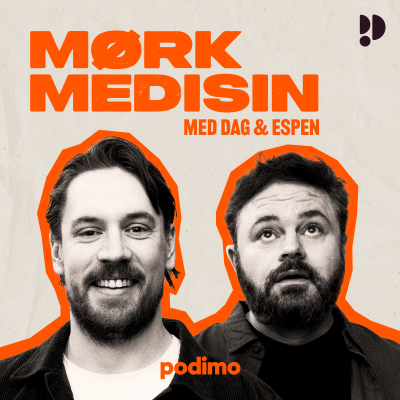
Mad in America: Rethinking Mental Health
Podkast av Mad in America
Tidsbegrenset tilbud
1 Måned for 9 kr
Deretter 99 kr / MånedAvslutt når som helst.

Mer enn 1 million lyttere
Du vil elske Podimo, og du er ikke alene
Vurdert til 4,7 stjerner i App Store
Les mer Mad in America: Rethinking Mental Health
Welcome to the Mad in America podcast, a weekly discussion that searches for the truth about psychiatric prescription drugs and mental health care worldwide. Hosted by James Moore, this podcast is part of Mad in America's mission to serve as a catalyst for rethinking psychiatric care. We believe that the current drug-based paradigm of care has failed our society and that scientific research, as well as the lived experience of those who have been diagnosed with a psychiatric disorder, calls for profound change. On the podcast we have interviews with experts and those with lived experience of the psychiatric system. Thank you for joining us as we discuss the many issues around rethinking psychiatric care around the world. For more information visit madinamerica.com To contact us email podcasts@madinamerica.com
Alle episoder
276 EpisoderOn July 21st 2025, the FDA convened a hearing [https://www.fda.gov/patients/fda-expert-panels/fda-expert-panel-selective-serotonin-reuptake-inhibitors-ssris-and-pregnancy-07212025] on maternal use of antidepressants during pregnancy and the impact this use has on fetal development. Around 400,000 children in the United States are born each year whose mothers took antidepressants while pregnant, and so it's easy to see the societal importance of this topic. What are the risks to the fetus, the newborn, and the long-term development of that child? Adam Urato and Joanna Moncrieff were members of that FDA panel, and so too were several others well-known to MIA readers, including David Healy and Joseph Witt-Doerring. The purpose of the panel was to assess whether the FDA needed to put a warning on antidepressants related to their use in pregnancy, and most on the panel spoke of research that told of the need to do so. However, after the panel concluded, the American Psychiatric Association and other medical associations, most notably the American College of Obstetricians and Gynecologists, responded with what can only be described as howls of outrage, issuing press releases and telling the public that the panel was biased and that the real risk during pregnancy was untreated mental illness. These medical organizations asserted that the increased risk of adverse outcomes for children born to depressed mothers is due to the illness and not the drug, and that there was plenty of evidence that antidepressants were a helpful and even life-saving treatment for maternal depression. Here is where we are today. That FDA hearing put two narratives on public display, and most media reports embraced the narrative put forth by the medical organizations. What we will do today is review the evidence that exists on this topic and the response by the medical guilds to a public airing of that evidence. Dr. Adam Urato is Chief of Maternal and Fetal Medicine at the Metro West Medical Center in Framingham, Massachusetts, and he has been speaking and writing about the risk of medications used during pregnancy for years. Dr. Joanna Moncrieff is a UK psychiatrist and researcher who was a co-founder of the Critical Psychiatry Network and is well known for her research on the safety and efficacy of psychiatric drugs. *** Thank you for being with us to listen to the podcast and read our articles this year. MIA is funded entirely by reader donations. If you value MIA, please help us continue to survive and grow. https://www.madinamerica.com/donate/ [https://www.madinamerica.com/donate/] To find the Mad in America podcast on your preferred podcast player, click here: https://pod.link/1212789850 [https://pod.link/1212789850] © Mad in America 2025. Produced by James Moore https://www.jmaudio.org [https://www.jmaudio.org/]
Frank Gruba-McCallister is a clinical psychologist, educator, and scholar whose career spans more than three decades of teaching and academic leadership. He served as Vice President of Academic Affairs at Adler University [https://www.adler.edu/program/clinical-psychology-chicago/], where he helped to reorient the institution's mission toward training socially responsible practitioners. His leadership and curricular reforms contributed to Adler's doctoral program receiving the American Psychological Association's Board of Educational Affairs Award for Innovative Practices in Graduate Education in 2007. He has also taught at the Illinois School of Professional Psychology and The Chicago School of Professional Psychology, and worked as a clinician in both medical settings and private practice. Throughout his career, Dr. Gruba-McCallister has been a steady voice at the intersection of critical psychology, humanistic and existential thought, and spiritual inquiry. He is the author of Embracing Disillusionment: Achieving Liberation Through the Demystification of Suffering [https://universityprofessorspress.com/product/embracing-disillusionment/], a book that examines how internalized oppression and ideological mystification compound human suffering and how healing demands a deep and sometimes painful confrontation with illusions. His newest book, Radical Healing: No Wellness Without Justice [https://universityprofessorspress.com/product/frank-gruba-mccallister-bundle/], published by University Professors Press, draws from liberation theology, critical theory, existential psychology, and transpersonal thought to explore the structural and spiritual roots of suffering. At its core is a call to restore moral responsibility, to reclaim compassion and justice as central to any meaningful model of care, and to invite those who seek to heal others to do so with humility, courage, and radical honesty. In our conversation, we discuss the origins of this work, the crises that shape our current moment, and what it might mean to envision psychotherapy as both a spiritual and political act. *** Thank you for being with us to listen to the podcast and read our articles this year. MIA is funded entirely by reader donations. If you value MIA, please help us continue to survive and grow. https://www.madinamerica.com/donate/ [https://www.madinamerica.com/donate/] To find the Mad in America podcast on your preferred podcast player, click here: https://pod.link/1212789850 [https://pod.link/1212789850] © Mad in America 2025. Produced by James Moore https://www.jmaudio.org [https://www.jmaudio.org/]
John Ioannidis is a Stanford professor, a physician, and one of the most eminent scholars in the world in the field of evidence-based medicine. Ioannidis has spent his career exposing the weak foundations of much of modern medicine. His 2005 paper, "Why Most Published Research Findings Are False," became the most-viewed [https://www.madinamerica.com/2014/06/published-research-findings-false-passes-one-million-views/] article in the history of PLOS Medicine [https://www.madinamerica.com/2014/06/published-research-findings-false-passes-one-million-views/] and helped spark a global reckoning with reproducibility. He has since warned about how evidence-based medicine can be hijacked [https://www.madinamerica.com/2016/04/has-evidence-based-medicine-been-hijacked/]by industry influence, how biased reward systems [https://www.madinamerica.com/2014/08/science-biased-reward-systems/] in academia favor quantity over quality, and how even systematic reviews can recycle flawed data [https://www.madinamerica.com/2016/09/garbage-in-garbage-out-systematic-reviews-and-meta-analyses-tell-us-a-flawed-story/]. His critiques extend to psychiatry, where pharma-funded trials often tilt toward positive results [https://www.madinamerica.com/2024/03/pharma-funded-trials-biased-toward-positive-results-for-industry/], guidelines are shaped by insiders [https://www.madinamerica.com/2019/01/treatment-guidelines-not-written-professional-societies-insiders/], and neuroscience findings are more fragile than they appear [https://www.madinamerica.com/2016/09/ioannidis-questions-strength-of-psychology-and-neuroscience-literature/]. He is a tenured professor at Stanford and has an extensive background in medicine, epidemiology, population health, and data sciences. As much as he is a champion of good science, Ioannidis is also a lover of the arts and humanities. He's a novelist, teaches poetry, loves operas, and has written libretti for four operas himself. In this interview, he discusses the extensive bias that pervades scientific research, the problematic practices and pressures that enable flawed science, and the significant issues with antidepressant research. At the same time, he reminds us why good science is a gift to humanity and something we must protect for our well-being and dignity. *** Thank you for being with us to listen to the podcast and read our articles this year. MIA is funded entirely by reader donations. If you value MIA, please help us continue to survive and grow. https://www.madinamerica.com/donate/ [https://www.madinamerica.com/donate/] To find the Mad in America podcast on your preferred podcast player, click here: https://pod.link/1212789850 [https://pod.link/1212789850] © Mad in America 2025. Produced by James Moore https://www.jmaudio.org [https://www.jmaudio.org/]
Talia Weiner is a psychological anthropologist, licensed professional counselor, and assistant professor of psychology at the University of West Georgia. As a medical and psychological anthropologist, her work focuses on the intersection of social-structural forces and how those forces show up in lived experience, particularly in relation to mental health care. Weiner studies these and other topics with students in the Clinical Ethnography Lab within the University of West Georgia's psychology program. Weiner has an upcoming book titled Therapeutic Inequalities: Mood Disorder Self-Management in Chicago [https://nyupress.org/9781479817634/therapeutic-inequalities/], scheduled for release Jan. 6, 2026, through NYU Press's Anthropologies of American Medicine: Culture, Power, and Practice series. In this interview, Weiner discusses how conservative sociopolitical trends influence psychology and mental health care—how, for example, people with bipolar disorder are expected to monitor and manage themselves in ways that are not only unrealistic but also blur the lines between self and disease. *** Thank you for being with us to listen to the podcast and read our articles this year. MIA is funded entirely by reader donations. If you value MIA, please help us continue to survive and grow. https://www.madinamerica.com/donate/ [https://www.madinamerica.com/donate/] To find the Mad in America podcast on your preferred podcast player, click here: https://pod.link/1212789850 [https://pod.link/1212789850] © Mad in America 2025. Produced by James Moore https://www.jmaudio.org [https://www.jmaudio.org/]
On the Mad in America podcast this week, we explore the importance of raising awareness of psychological approaches that challenge mainstream perspectives. Joining us today are three people who are practising clinical psychologists and who have written for Mad in America. Zenobia Morrill is a critical-liberation psychologist and psychology professor who received her doctorate from the University of Massachusetts, Boston. Her research interests include critical and liberation psychology, the psychotherapy process, and wider conceptual and ethical issues in psychology and psychiatry. José Giovanni Luiggi-Hernández is a clinical psychologist in private practice, a qualitative researcher at the University of Pittsburgh, a writer for Mad in America and part of the recently launched Mad in Puerto Rico [https://madinpuertorico.org/] website. His interests include understanding the lived experiences of colonized people using phenomenological, psychoanalytic, and decolonial frameworks, LGBTQ issues and psychotherapy for physical health concerns. Also joining us is Mad in America's lead research news editor, Justin Karter. A graduate in both psychology and journalism, Justin's research and writing span topics in the philosophy of psychology, critical psychology, MAD studies, cross-cultural psychology, qualitative methods, and theories of counselling and psychotherapy. In this conversation, we discuss the possibilities opened up by adopting a critical mindset, identify some of the barriers to working in such a way, and share some key resources to help aspiring psychologists explore alternative approaches. Find a full transcript of this interview here: https://www.madinamerica.com/2025/08/how-to-be-a-critical-psychologist-without-losing-your-soul/ [https://www.madinamerica.com/2025/08/how-to-be-a-critical-psychologist-without-losing-your-soul/] *** Thank you for being with us to listen to the podcast and read our articles this year. MIA is funded entirely by reader donations. If you value MIA, please help us continue to survive and grow. https://www.madinamerica.com/donate/ [https://www.madinamerica.com/donate/] To find the Mad in America podcast on your preferred podcast player, click here: https://pod.link/1212789850 [https://pod.link/1212789850] © Mad in America 2025. Produced by James Moore https://www.jmaudio.org [https://www.jmaudio.org/]

Mer enn 1 million lyttere
Du vil elske Podimo, og du er ikke alene
Vurdert til 4,7 stjerner i App Store
Tidsbegrenset tilbud
1 Måned for 9 kr
Deretter 99 kr / MånedAvslutt når som helst.
Eksklusive podkaster
Uten reklame
Gratis podkaster
Lydbøker
20 timer i måneden

































